
Vote ‘yes’ to shift tax money to recreation and City Park
By The Times-Picayune Editorial Board
Source: NOLA.com | The Times-Picayune
April 21, 2019
The Times-Picayune Editorial Board makes the following recommendation for the May 4 ballot.
ORLEANS PARISH
PARKS AND RECREATION TAX PROPOSITION
To replace three existing property taxes for parks and recreation totaling 6.31 mills with a single tax at the same 6.31-mill rate for 20 years and change the way the money is divided.
Yes
New Orleanians are lucky to live in a place with so much green space. The city has at least 4,500 acres of public land, including pocket parks tucked into many neighborhoods, Audubon Park and City Park, the largest of them all. There are public golf courses, football fields, swimming pools, playgrounds and half a million trees on public property to maintain.
Right now, the Audubon Commission gets more than half of the 6.31 mills the city collects for parks and recreation to use for the zoo and the aquarium. The other 3 mills of tax are split evenly between the New Orleans Recreation Development Commission (NORDC) and the Department of Parks and Parkways.
City Park, despite its size and importance in the city landscape, gets none of that tax money right now.
This proposal would fix that omission without increasing taxes. Under the replacement tax, the Audubon Commission would get less money, NORDC and Parks and Parkways would get about $1 million more annually and City Park would get a share for the first time. Although Audubon would get an estimated $4 million less from the replacement tax, the money could be used on any of its properties — not just the zoo and aquarium, the Bureau of Governmental Research points out in an analysis of the tax proposal.
That is a smart way to maximize tax dollars.
This is how the money would be divided under the replacement tax: City Park, .61 mills, $2 million annually; Parks and Parkways, 1.8 mills, $6 million annually; NORDC, 1.95 mills, $6.4 million annually, and Audubon, 1.95 mills, $6.4 million, according to BGR.
The change is especially important for City Park. The 1,300-acre park “suffered severe damage during the Hurricane Katrina disaster, but has recovered using a mix of public and private funding and extensive volunteer efforts,” BGR said. “Although it has rebuilt itself since Hurricane Katrina, City Park continues to rely on more than 90% self-generated operating revenue.” The $2 million in annual tax dollars would give the park more financial security.
The extra money also would be a boost to NORDC and Parks and Parkways.
NORDC manages 166 parks, playgrounds and community centers used for recreation. Those programs are a vital service for children in the city. Parks and Parkways maintains the city’s public green space, including Jackson Square and more than 50 other parks, the neutral grounds and all of the city’s 500,000 trees. That is a big task that impacts the look and feel of New Orleans.
Under the replacement tax, the money can be used in a variety of ways: improving safety and accessibility; managing stormwater to reduce flooding; repairing or improving playgrounds and recreation centers; building, improving and operating parks, recreation areas and wildlife conservation facilities.
Approval of the tax also would trigger a cooperative endeavor agreement among the agencies that would include collaborations on maintenance, programming and planning of capital projects. The city and the agencies also agreed to come up with a 10-year master plan for parks. That should lead to smarter growth and a better outcome for New Orleanians.
BGR is in favor of the replacement tax plan. “New Orleans’ parks and recreation facilities support citizens’ quality of life. They also draw many visitors from around the region and beyond. But the existing property taxes fund too narrow a range of entities and purposes. The proposition gives voters a chance to rebalance the tax revenue,” the watchdog group said in its analysis.
This is a far different approach than the Audubon Commission took in 2014, when it tried to increase the two taxes dedicated to the zoo and aquarium, broaden what they could be used for and extend them for 50 years. Voters rejected that plan by a wide margin.
The proposal on the May 4 ballot is a much smarter and fairer way to pay for parks.
Fair Use Notice
This site occasionally reprints copyrighted material, the use of which has not always been specifically authorized by the copyright owner. We make such material available in our efforts to advance understanding of issues and to highlight the accomplishments of our affiliates. We believe this constitutes a “fair use” of any such copyrighted material as provided for in section 107 of the US Copyright Law. In accordance with Title 17 U.S.C. Section 107, the material on this site is available without profit. For more information go to: US CODE: Title 17,107. Limitations on exclusive rights: Fair use. If you wish to use copyrighted material from this site for purposes of your own that go beyond “fair use,” you must obtain permission from the copyright owner.
